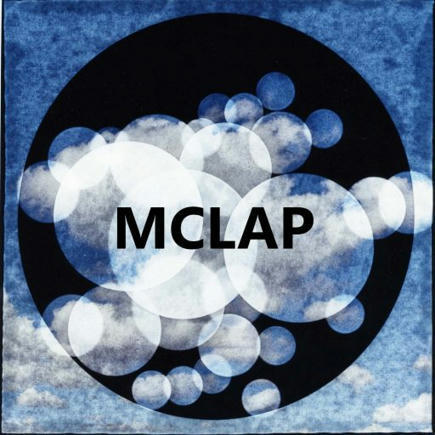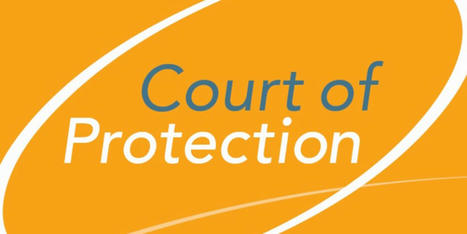 Your new post is loading...
 Your new post is loading...

|
Scooped by
Jacqui Gilliatt
March 12, 2024 5:47 AM
|
Sir Geoffrey Vos gave the keynote speech at Manchester Law Society's AI Conference 2024: Transforming the Legal Landscape...

|
Scooped by
Jacqui Gilliatt
March 12, 2024 5:46 AM
|
Lieven J is proving herself the spiritual successor to Mostyn J as regards challenging Cheshire West. In order to make this assertion good, we need to take a trip back in time.Readers with long-i…...

|
Scooped by
Jacqui Gilliatt
March 12, 2024 5:45 AM
|
UK based daily legal news archive on Law, Lawyers, Law Firms, Justice, Jurisprudence, Legislation, Litigation, Legal Ethics & Human Rights...

|
Scooped by
Jacqui Gilliatt
March 1, 2024 4:01 AM
|
UK based daily legal news archive on Law, Lawyers, Law Firms, Justice, Jurisprudence, Legislation, Litigation, Legal Ethics & Human Rights...

|
Scooped by
Jacqui Gilliatt
February 29, 2024 6:31 AM
|
Law student Jodie Chennell explores how the legal industry can become more inclusive of neurodiversity...

|
Scooped by
Jacqui Gilliatt
February 28, 2024 6:06 AM
|
Guest post by Graeme Johnston This post seeks to summarise the current position on retired UK senior judges returning to legal practice and suggests that it would be good to clarify it officially. Background In June 2023, the academics Patrick O’Brien and Ben Yong published a research paper on legal work done by retired judges.…

|
Scooped by
Jacqui Gilliatt
February 28, 2024 6:03 AM
|
School leavers starting on up to £28k...

|
Scooped by
Jacqui Gilliatt
February 27, 2024 4:10 PM
|
The Weekly Round-up: Shamima Begum loses appeal, ICJ considers situation in the West Bank, Ukraine Family Scheme closes...

|
Scooped by
Jacqui Gilliatt
February 27, 2024 4:09 PM
|
There are currently fourteen inquiries being undertaken under the Inquiries Act 2005. The most recent of these is the Covid-19 Inquiry, which has generated a great deal of press attention. In the wake of this, the House of Lords has just set up a new select committee to examine the law and practice of public inquiries. But where have public inquiries stemmed from, and how can they be reformed? Public inquiries are a vital fixture of our constitution and play an important role in the government’s response to major crises. They are triggered by matters of public concern with common characteristics being large scale loss of life, serious health and safety issues, or failure in regulation. While they provide an important rebuilding of public confidence, and a level of accountability, they are primarily factfinders and aim to offer a full and fair account of what happened. They can bring catharsis and have the advantage of being flexible in contrast to litigation, offering inquisitorial rather than adversarial procedures. This flexibility provides for a more compassionate, human-focused procedure, such as when victims of the mid-Staffordshire NHS Trust were able to have free counselling during the inquiry. Similarly, the Post Office Inquiry ran a human impact phase to hear direct testimonies of those affected. Historically, inquiries had been conducted by parliamentary committees; however, their lack of independence caused difficulties, and in 1921 this power was moved to public tribunals. The Inquiries Act 2005 introduced measures to make inquiries faster, procedurally more effective, and less costly, but at the cost of giving more power to the ministers. The Act moved responsibility for establishing an inquiry from Parliament to ministers, equipped with an additional degree of control over their operation. Section 14 gives the minister the power to end an inquiry, after consulting with the chairperson. Section 19 provides the minister as well as the chairperson with the ability to restrict the attendance and evidence disclosure in an inquiry, and section 25 the authority to arrange for the publication of the report, which he or she can defer to the chairperson. The minister therefore has a substantial degree of control, which appears unnecessary given the high levels of seniority and experience the chairs have. Reform of the Inquiries Act should therefore address this ministerial control, as recognised by the 32 reforms recommended by the Select Committee. These included a recommendation that the minister’s power to issue a restriction notice under section 19 should be abrogated, and that the chairperson should be the sole decision-maker in the withholding of the Inquiry’s material from publication. It recommended that the requirement to send warning letters to all those facing criticism in the report should be left to the sole discretion of the chair. It suggested the setup of a central inquiries unit to deal with inquires and their implementation. These reforms could make inquiries more streamlined and create an enhanced level of trust in the chairperson. The transparency of inquiries is also essential to their success. Inquiries have strong powers of compulsion under Section 21, which forced the disclosure of Boris Johnson’s WhatsApp messages for the Covid Inquiry. But this power is challenged when the inquiry is exposing past political behaviour. Section 35 makes it an offence to fail to comply with a formal notice requiring the production of evidence. However, this applies for the duration of an Inquiry rather than retrospectively. Messages that have been long-ago deleted aren’t caught by this legislative framework, and politicians have been able to delete messages without censure, a deficiency that should be tightened. The increase in public inquiries and the greater transparency that they provide to the public could conceivably lead to a change in behaviour from people in positions of power. Another difficulty with inquiries is their inability to mandate their recommendations. The government is ultimately responsible for enforcing them, but there are no consequences for failure to do so, or outright rejection. Nonetheless, past inquiries have provoked significant change in regulation. After the Francis Inquiry report recommended NICE publish guidance on the safe staffing of nurses, it did so. Similarly, the Leveson Inquiry recommendations led to a Royal Charter on press regulation to be granted with the oversight of a Press Recognition Panel, incorporating key recommendations from its report. Public inquiries should be celebrated as core constitutional instruments that bring truth, catharsis and apportion blame for those who have suffered major miscarriages of justice. The Inquiries Act has made progress by defining the role of the chair, but the level of ministerial involvement remains controversial. A greater focus and trust in the chair would instil public confidence and absolute independence.

|
Scooped by
Jacqui Gilliatt
February 12, 2023 1:06 PM
|

|
Scooped by
Jacqui Gilliatt
February 12, 2023 12:47 PM
|
UK based daily legal news archive on Law, Lawyers, Law Firms, Justice, Jurisprudence, Legislation, Litigation, Legal Ethics & Human Rights...

|
Scooped by
Jacqui Gilliatt
May 19, 2021 5:58 AM
|
Home > News Mr Justice Cohen retires Mr Justice Cohen retired from the High Court (Family Division) with effect from 9 May 2021, but will be authorised to act as Judge of the High Court until up to and including 2 January 2024 and will therefore continue to sit effectively full time. Sir Jonathan Cohen was called to the Bar (L) in 1974, took Silk in 1997 and was elected a Bencher in 2004. He was appointed an Assistant Recorder in 1993, a Recorder in 1997, a Member of the Mental Health Review Tribunal in 2000 and authorised to sit as a Deputy High Court Judge in 2005. He was appointed a High Court Judge (Family Division) in 2017. 16/5/21

|
Scooped by
Jacqui Gilliatt
May 19, 2021 4:58 AM
|
Home > News Domestic Abuse Act 2021 commencement schedule The Home Office has issued a schedule of the commencement dates of the provisions of each section of the Domestic Abuse Act 2021. For the schedule, click here. 16/5/21
|

|
Scooped by
Jacqui Gilliatt
March 12, 2024 5:47 AM
|
Budding barrister seeks help...

|
Scooped by
Jacqui Gilliatt
March 12, 2024 5:46 AM
|
The top legal affairs news stories from this morning and the weekend...

|
Scooped by
Jacqui Gilliatt
March 12, 2024 5:44 AM
|
Home Office fails to inform the families of asylum seekers who die in their care By Nandini Pradeep 12 March 2024 | 9:27 am Human rights, Immigration, News By Nandini Pradeep 12 March 2024 | 9:27 am Home Office fails to inform the families of asylum seekers who die in their care The Home Office has admitted it does not routinely inform the families of asylum seekers who have died in their care. It is also restricting the release of information about these deaths publicly due to concerns that it might ‘endanger mental health.’ As of August 2023, 176 asylum seekers are thought to have died under the Home Office’s care at Home Office accommodation since 2020. The Civil Fleet, an organization that regularly applies for information requests from the Home Office, has reported that the Home Office has not provided information about the race and gender of five people who have died in the first six months of 2023 in Home Office accommodation. This is despite providing such information in previous years such as 2021, 2022 and early 2023. The reason given by the Home Office for failure to disclose this information is through reliance on Section 38(1)(a) and (b) of the Freedom of Information Act 2000, on the basis that its release ‘would, or would likely, endanger the physical or mental health of any individual’, or ‘endanger the safety of any individual’. The risk, according to the Home Office, is that this information may be used to identify and endanger the safety of asylum seekers and their families. The Civil Fleet has appealed the decision to the Information Commissioner’s office who has requested that the Home Office disclose this information by 4th April, or they may otherwise be found in contempt of court. The Home Office may appeal this decision; however, they have admitted there is no previous causal link between disclosure of this information and the identifying of the individual asylum seekers. Deborah Coles, the director of INQUEST, a charity investigating contentious deaths, has said: ‘The levels of obfuscation and denial from the Home Office are unparalleled across any other public body. They show utter contempt for people who die in their care and their families. There is clear disregard for their legal and moral responsibility.’ A Home Office spokesperson has responded to assure that they will continue to ‘ensure the needs and vulnerabilities of those residing in asylum accommodation are identified and considered, including those related to mental health and trauma.’ They have also expressed disappointment in the ICO ruling and have said they will be considering their next steps. The Home Office also faced fresh criticism yesterday following comments made by David Neal, the sacked independent borders inspector, who told the BBC that the Home Office was ‘dysfunctional’ and ‘in need of reform’. He revealed that, within 18 months, there had been four different officials in charge of emergency accommodation for asylum seekers, which he described as ‘absolute madness in terms of accountability.’ Neal has also described the conditions in asylum accommodation for children being brought ashore from small boats as worse than the facilities ‘for detained Taliban terrorists in Afghanistan.’ Whilst he said these concerns appeared to be taken seriously, they were not given sufficient attention as the (then) Home Secretary Priti Patel failed to meet him, and her successor, Suella Braverman, only met with him twice. Neal also claimed on the BBC’s Today Podcast that he did not gain access to higher-ups to report on issues that needed reform. 15 of Neal’s reports were originally held back from publication for 18 months, although 13 of which are now online. Mr. Neal was sacked for the release of sensitive information over the lack of sufficient radios at the Heathrow e-passport gates which reportedly lost him the trust of the Home Secretary. Author: Nandini Pradeep Nandini Pradeep is a third-year law student at UCL and formerly the Creative Editor of the Law Society Publications. She is interested in legal journalism, particularly the societal dimensions of law. Most Popular ‘Hope can be a cruel concept’ – Joint Enterprise and ‘Substantial Injustice’ Police officer drags and stamps on homeless refugee High levels of self-harm and girl forcibly stripped by male officers at HMYOI Wetherby – ... Demand for an independent inquiry after mistreatment of refugee children by Home Office staff Stay informed Sign up for our weekly newsletter Email Submit The Justice Gap is an online magazine about the law and justice run by journalists. read more... Our print magazine is Proof. Contributors include Michael Mansfield QC, Bob Woffinden, David Rose, Eric Allison and Ian Cobain. Buy Proof Magazine The latest issue (Why legal aid matters) includes Helena Kennedy QC and Martha Spurrier in conversation, David Conn on the legacy of Hillsborough - plus how to build your own law centre. Author: Nandini Pradeep Nandini Pradeep is a third-year law student at UCL and formerly the Creative Editor of the Law Society Publications. She is interested in legal journalism, particularly the societal dimensions of law. Related Posts Over 100 asylum seekers have died in Home Office…Legal challenge launched to ‘discriminatory’ Home…Home Office accused of 'bullying' asylum seekers by…Complex asylum cases handled by inexperienced staff,…Asylum Accommodation excluded from Social Housing…

|
Scooped by
Jacqui Gilliatt
March 1, 2024 4:00 AM
|
Weekly round-up of the top legal blogosphere posts...

|
Scooped by
Jacqui Gilliatt
February 28, 2024 2:06 PM
|
UK based daily legal news archive on Law, Lawyers, Law Firms, Justice, Jurisprudence, Legislation, Litigation, Legal Ethics & Human Rights...

|
Scooped by
Jacqui Gilliatt
February 28, 2024 6:04 AM
|
Legal Cheek flash poll...

|
Scooped by
Jacqui Gilliatt
February 27, 2024 4:10 PM
|
But number of applicants also up...

|
Scooped by
Jacqui Gilliatt
February 27, 2024 4:09 PM
|
UK based daily legal news archive on Law, Lawyers, Law Firms, Justice, Jurisprudence, Legislation, Litigation, Legal Ethics & Human Rights...

|
Scooped by
Jacqui Gilliatt
February 27, 2024 4:08 PM
|
UK based daily legal news archive on Law, Lawyers, Law Firms, Justice, Jurisprudence, Legislation, Litigation, Legal Ethics & Human Rights...

|
Scooped by
Jacqui Gilliatt
February 12, 2023 12:53 PM
|
Injunctions, DoLS and public protection, transparency/anonymity, cross-border checklists, collection/storage of sperm following catastrophic brain injury.

|
Scooped by
Jacqui Gilliatt
May 19, 2021 5:59 AM
|
Law and Guidance Podcast Series with Sally Penni Barrister at Law. Discussing Legal concepts....

|
Scooped by
Jacqui Gilliatt
May 19, 2021 5:57 AM
|
Home > News Current provision of Domestic Abuse Perpetrator Programmes Cafcass has issued with immediate effect, temporary guidance to support Family Court Advisers when making recommendations progressing cases in the current context where Domestic Abuse Perpetrator Programme (DAPP) provision is severely limited. Prior to the pandemic, Cafcass says, the family justice system was under enormous pressure with increases in numbers across all areas of public and private family law. After over a year of working with the constraints of the pandemic, the system finds itself with significant backlogs, in certain types of work. The provision of DAPPs in England has been adversely affected due to the necessary face-to-face delivery model and a number of DAPP providers have had to reduce or suspend their offer. Careful consideration has been given to the possible development of remote DAPPs using another safe alternative, however, there is not yet sufficient evidence to support the adoption of a remote model. Unfortunately, a backlog of several hundred cases has accrued. Cafcass appreciates that this backlog has a considerable impact on parents and their children who need certainty about their contact arrangements. Leaders across the family justice system agree that there must be collective action to address this and consider alternative options where safe and in the interests of the child and a temporary process has been agreed. This applies in England only as DAPPs are not available in Wales. The temporary process is outlined below: Cafcass has issued with immediate effect, temporary guidance to support Family Court Advisers when making recommendations progressing cases in the current context where DAPP provision is severely limited. Cafcass is establishing a small, dedicated team to review the circumstances of families for whom a DAPP has been ordered, but not yet completed, prioritising first those for whom a DAPP has not yet commenced. These case reviews will involve a Family Court Adviser reviewing the child's file, speaking with adults and children to re-assess the current risks and options, taking account of the new guidance. The child will be given the opportunity to write to the court explaining the impact for them and their wishes and feelings. For cases that have been reviewed, Cafcass will request the court's permission to file a further report, and there may need to be a further hearing to consider this. These reports may recommend either: (a) that the case remains on the waiting list as no safe and beneficial arrangements for time with the child are possible without this provision, with appropriate ongoing oversight including a process of monthly review; or (b) that the application to court for the existing order for a DAPP can be discharged and an alternative plan (informed by the reassessment) can be put in place: this could be a final order of no contact, a final order for contact with a safety plan and other provision, or an interim order for 'a step-by-step approach to the progression of contact arrangements', with a further review and an addendum ordered. From 1 May 2021, Child Contact Interventions commissioned by Cafcass on behalf of the Ministry of Justice were replaced with the new Improving Child and Family Arrangements (ICFA) service. The ICFA service is designed to be a more tailored and less prescriptive approach to meet the needs of individual children and their families. In areas where there is capacity to commence new individuals in face-to-face DAPP programmes, families identified at 3a above will take priority, under new arrangements for oversight, which are currently being developed. Cafcass will only start making referral recommendations in reports for new cases once those families with delayed proceedings have been able to progress, unless a DAPP is seen to be the most suitable option. In this situation, the family will be added to the DAPP waiting list. Implementation of this temporary process will result in new referrals for DAPPs only being made in cases where it is truly necessary and having due regard to the delay this order will inevitably cause. Cafcass will keep the temporary arrangements under review and share the learning with the National Recovery Group. It is anticipated that DAPP provision will be reinstated when the system has recovered. Cafcass Chief Executive Jacky Tiotto and Sir Andrew McFarlane, President of the Family Division said: "We recognise how incredibly important it is for children and their families to receive the services they need without delay. The consequences of the pandemic and the essential need for the Domestic Abuse Perpetrator Programme to take place in-person has meant this hasn't always been possible. "We are working with all involved in family justice to ensure that the people currently waiting to take part in the programme are prioritised and that we have measures in place to ensure that waiting times are kept to a minimum and regularly reviewed for children and their families." For the temporary guidance to support Family Court Advisers when making recommendations, click here and follow the link at point 1. 16/5/21
|
 Your new post is loading...
Your new post is loading...
 Your new post is loading...
Your new post is loading...
































